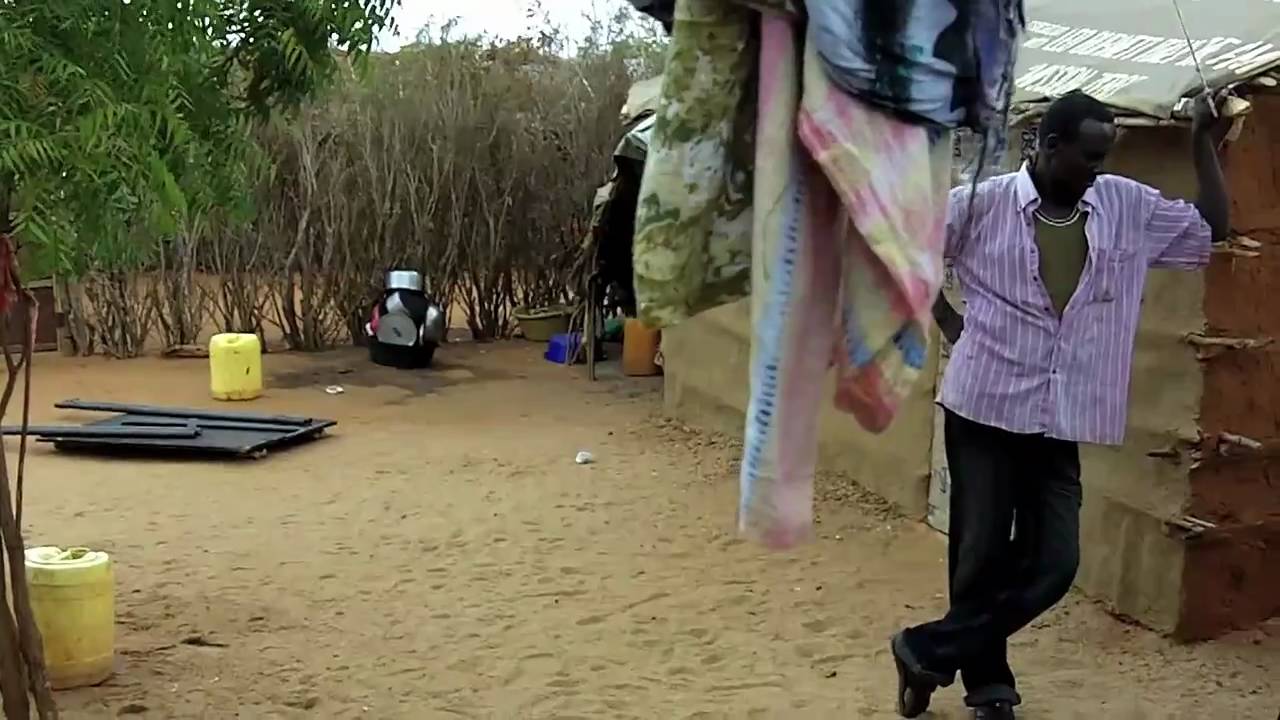Unspeakable

I tried. One month later, I’ll try again.
On November 9, I first entered the residential blocks of Ifo, one of the three camps in Dadaab. On that day, in no small part, I lost my innocence. I learned nothing new and saw nothing I hadn’t seen on our living room TV. But I was welcomed in by people who, to so many, are only data points and statistics. I wish that everyone could have that opportunity for themselves.
We were shooting the first scene in our film about rape, and what to do if a loved one is raped. Women walking alone through the camps, as they often do, are in serious danger of being taken advantage of; a huge proportion of the women in Ifo have been raped.
A feeling of camaraderie pervaded as I rode in the back of the truck with over ten people, bumping violently on the dusty streets and picking up cast and crew members as it went. I quickly learned to grab hold of the hot metal bars to avoid careening into the person next to me. It was the first day of shooting, always exciting, and I was looking forward to making a lot of friends from a new culture.
We jumped out of the van at the location, what appeared to be a typical house in the camp. I’d been observing the dwellings as we drove in, and there was a patchwork consistency to them. Some seemed made of clay, others were constructed of sheetmetal with the words USA printed onto them. Quite a few appeared to be made of twigs and branches, insulated with sparsely distributed t-shirts and scraps of canvas.
As the generous Somalis welcomed us into their home, I imagined that they did not see this interaction the same way as I did, having less of a frame of reference for the extent of the gulf that separated us. “They couldn’t possibly know what my community is like, how my family lives. A beach, a car, vacations when the US gets boring. That the poor in my country have access to voting, internet, schools and homes. They can’t possibly know how these eyes see.” I felt shame, a powerful crippling shame at how they would have felt if they stepped foot inside my home and then welcomed me in. And I felt shame for us as a world, now having seen our hidden worst. These were decent, intelligent people who fled bloody conflict only to see themselves restricted to a 10-mile radius and a bag of flour a week.
I tried to hide the churn in my stomach, tried to smile as if I did this every day and was nothing but happy to be there; tried to hold back from staring. I was the white man in the midst, all eyes were on my eyes and taking in their every dart. I was in a capacity to execute judgment and more than anything else wanted that they never knew these thoughts.
The stares that I had experienced in the Somali market increased in intensity, and those who wished to stare had ample opportunity as I was at this house for the entire day. I’d grown to tolerate them, taking joy in providing some entertainment. I acted like a facial litmus test, and any Somali under the age of 20 seemed uninterested in hiding their reactions to me. Small children of less than four years old cowered in my sight, their faces usually half hidden by the robes of their mother. Slightly older ones stared and sometimes smiled, but only the brave ones actually spoke. One mocked me, making saluting postures and laughing. Most of them found something or other about me hilarious.
One little gap-toothed boy kept smiling at me and approached me, waving “hello.” I waved back. After an older boy came up and started translating I was able to ask his name – I don’t remember it now. “He’s interested in you because of your skin color, he’s never seen it,” said one of the Somalis. I smiled and held up my hand, pointing to it and then to his. He smiled. He put his hand on his chin and face where my stubble was. I did the same. Then he ran his fingers across his teeth, where my braces were.
“He wants to know about those things on your teeth,” the older boy said, “what are they?” I froze. I tried to dodge the question but eventually admitted: “It’s to straighten my teeth.” He smiled a gummy smile, and I forced a smile back.
The older boy asked “where are you from?” and I answered “America.” “Is America nice?” he asked. “Oh yes, very nice.” “Is Kenya nice?” I was thrown into silence for a second and said unconvincingly “yes, Kenya is nice,” then adding “but the conditions in the camps are not so good.” I didn’t know whether this was something he already thought. A new boy approached and I taught him a variant of the fist bump.
We left for a few hours to shoot another scene, and as we drove away from the house kids chased the van, smiling and waving. I thought about a boy I’d met a few days ago while waiting for transport, who stood with a group of friends holding the Koran in his hands. I asked him if he lived with his parents and he said they were both dead. I thought of the religious devotion I had seen and got angry, thinking to myself “the people here are earnestly devoted to a god who has forgotten them. How can you live here and believe in god?” All that I saw on that day shook my faith more than anything previously. It was clear that men are able to destroy without check, countered in vain by the futile sympathies of others.
The hot sun bore down and I could feel my pale skin turning red and the nascent aging in my bones crying its ache. Standing brought discomfort, sitting welcomed armies of ants to crawl around my skin. I wished for the day to be over.
We returned to the house for lunch and on the way were given sodas. There were no bottle openers (soda time is always an exercise in creativity) and the kind refugee who was playing the rape victim took my soda and popped the top off with her mouth. Lunch was large metal bowls of pasta. I skipped lunch.
Later in the day a larger crowd gathered to watch us film, and during a moment of free time my gap-toothed little friend waved shyly to me and showed me a broken blue ball he was holding, about the size of a tennis ball. I motioned for him to toss it to me and we began to toss it back and forth. I then threw it way high in the air and he laughed. We tried to see who could throw it higher. A second boy joined in and the game became monkey-in-the-middle, with my gap-toothed friend struggling to catch it. About 15 other boys joined in and the game progressed from catch to hackey sack to football (American soccer) and then improbably became volleyball. I laughed with a desperate joy, my anxious energy channed into the singleminded fun that comes of desperation. We ended the game and I felt a rush of adrenalin and joy at my new African friends, and then it was time to go.
From the back of the truck I waved to my new friends. It seemed the entire camp knew my name as I heard calls of “hey Michael! Michael!” even from people I had not met. Word and gossip travels quickly. I waved to the boys I had been playing with and the owners of the house, and as we drove out I kept waving to anyone who would stare. A mother in her mid-twenties with three children around her. A man with a wheelbarrow. A little ten-year-old boy alone on the street looking confused. I wondered if this was how celebrities felt, being constantly stared at as a mirror of the others’ innermost prayers. I waved like a passenger on a giant ship, endowed with the power of mobility and leaving a strange world. In our relative motion I felt the immense gulf that did separate us, a gulf carved by kings and explorers, slave traders and some unbearable lightness of history and accidents of birth. A mindless and voracious chasm that swallowed, swallowed.
How did we let this happen? How can we continue to ravage for our own power or comfort. Sure, the United States is not the only one to blame. Sure, the US provides more aid than most other countries combined. But we have our complicity in not trying harder, and when we stand by and let it happen, we are denying our own humanity.
We need to solve these problems on a governmental level, not with the stopgap of sentiments and gestures. And yes, $300 million from the United States is a gesture not a solution. There is nothing wrong with enjoying life in the US and we must learn to do so without shame, because what good is reducing poverty if the rich aren’t happy? But the world needs to know better and be more aware. The world cannot use token words as a salve for callous destruction. And my frustration is not with individuals but this human condition, where as I first wrote these words I already felt myself suppressing the memories. It already felt like a bad dream.
That was one month ago, though I still remember the day’s details vividly. Visiting the camp doesn’t have nearly the same impact today as it did on that day. On some days I stun myself with how quickly my mind fills with a minor annoyance, fatigue, or hunger. I have had so many moments of joy in that open prison, and I hope to have ten days’ more. I also would like to emphasize that the conditions vary from person to person and these are only my initial reactions. There is much more dimension to the story and it’s not the same everywhere. And the people here are my friends and colleagues – they are not only statistics and stories.
